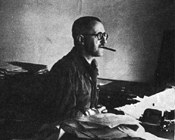







 One performer in Germany who is already very involved with Brecht Jahr is Konstantin Wecker. Wecker is a liedermacher who is almost legendary in his native country. Wecker's work in many ways continue Brecht's legacy of strong social criticism and satire.
His latest album is called, simply, Brecht and features ten songs which sound like the Wecker that Germany has been listening to for the past twenty years or so -- his characteristically percussive piano stylings sound very familiar. However, the lyrics courtesy of Brecht. Wecker makes each song his own with a unique fuse of jazz, pop,
and a very traditional German cabaret ambience in certain songs thanks to his eight-piece band, especially the strong accordion.
To learn more about Konstantin Wecker, you can visit his Official Konstantin Wecker Page. Maintained by Bine Maywald in Vienna, Austria, this site contains a lot of photos, biographical information, concert listings, and up-to-date news about Wecker. Even if you don't read German it's worth a look.
On the English side of things, I run the "Other" Konstantin Wecker Page in English, featuring information about Wecker in English including a critical study of his work, translations of his lyrics, and different photos than on the official site. If you visit, don't forget to sign my guestbook!
Brecht is published by Global Musicon, and distributed by BMG Ariola. It is not readily available outside of German-language countries, but can be imported by most record stores
(the CD number is: 74321 54274 2) or ordered online. To do the latter, please refer to my Online Shopping Sources set of Net Links. Of course, if you live in Germany, Austria, or (I think) parts of Switzerland, you can find Brecht at your local CD shops.
One performer in Germany who is already very involved with Brecht Jahr is Konstantin Wecker. Wecker is a liedermacher who is almost legendary in his native country. Wecker's work in many ways continue Brecht's legacy of strong social criticism and satire.
His latest album is called, simply, Brecht and features ten songs which sound like the Wecker that Germany has been listening to for the past twenty years or so -- his characteristically percussive piano stylings sound very familiar. However, the lyrics courtesy of Brecht. Wecker makes each song his own with a unique fuse of jazz, pop,
and a very traditional German cabaret ambience in certain songs thanks to his eight-piece band, especially the strong accordion.
To learn more about Konstantin Wecker, you can visit his Official Konstantin Wecker Page. Maintained by Bine Maywald in Vienna, Austria, this site contains a lot of photos, biographical information, concert listings, and up-to-date news about Wecker. Even if you don't read German it's worth a look.
On the English side of things, I run the "Other" Konstantin Wecker Page in English, featuring information about Wecker in English including a critical study of his work, translations of his lyrics, and different photos than on the official site. If you visit, don't forget to sign my guestbook!
Brecht is published by Global Musicon, and distributed by BMG Ariola. It is not readily available outside of German-language countries, but can be imported by most record stores
(the CD number is: 74321 54274 2) or ordered online. To do the latter, please refer to my Online Shopping Sources set of Net Links. Of course, if you live in Germany, Austria, or (I think) parts of Switzerland, you can find Brecht at your local CD shops.